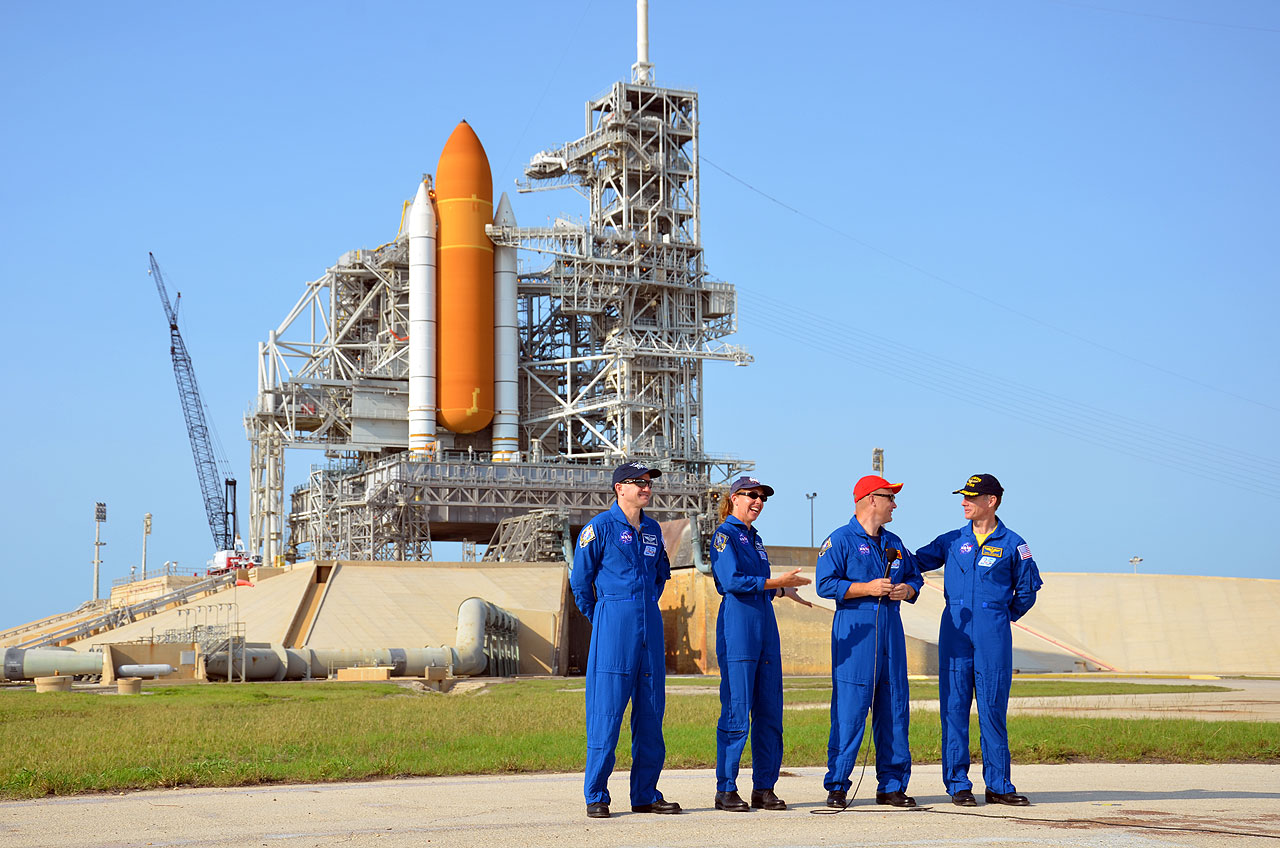Weather Looks Grim for NASA's Last Shuttle Launch

This story was updated at 12:38 p.m. ET
CAPE CANAVERAL, Fla. — NASA has cleared the space shuttle Atlantis for one final launch this week, but a dismal weather forecast is clouding plans for the upcoming Friday (July 8) liftoff.
NASA officials unanimously voted today (July 6) to clear Atlantis for launch, setting the stage for the last-ever mission of the space agency's 30-year space plane program, agency officials said via Twitter.
The latest weather outlook predicts a 70 percent chance of thunderstorms and rain showers too close to the seaside launch site where Atlantis sits poised for an 11:26 a.m. EDT (1526 GMT) blastoff on Friday. [Photos: NASA's Prepares for Final Shuttle Flight]
"It is not looking favorable right now for launch," NASA shuttle weather officer Kathy Winters told reporters here at the Kennedy Space Center.
A veritable tropical wave of weather threatens to pelt the area around Atlantis' launch pad with thunderstorms and rain, Winters said.
The chief concern is the risk of lightning, clouds and rain in Atlantis' flight path, as well as storms at a nearby landing strip, which would be needed in the remote chance the shuttle had to make an emergency landing shortly after launch. NASA launch rules require no stormy weather within 20 miles of the shuttle runway.
Breaking space news, the latest updates on rocket launches, skywatching events and more!
Shuttle's end nears
Atlantis and a skeleton crew of four astronauts will fly a 12-day mission to the International Space Station to make one final delivery before the shuttle program shuts down for good this year. The upcoming mission will be NASA's 135th and last shuttle flight of the 30-year program.
"It's getting more and more somber the closer we're getting to the end of the program," shuttle launch director Mike Leinbach said.
NASA is retiring the iconic shuttle program to make way for a new one aimed at sending astronauts on deep space exploration trips to asteroids and Mars. The cargo on Atlantis — spare parts, equipment and other supplies — is expected to help the space station continue flying despite the lack of regular big deliveries from visiting shuttles.
NASA and its contractors anticipate thousands of layoffs once the shuttle program shuts down. But even with the end of the space plane program looming large, officials said shuttle workers aren't eager for a delay, even it keeps them employed a bit longer.[Video: What The Space Shuttle Did For You]
"We are not at all in the mode that taking more time to make this launch happen is a good thing,"
said Mike Moses, chief of Atlantis' mission management team. "The team's ready. They're prepared. Everything is in the right spot. This is a normal countdown for us. It's time to go, so we're more than ready."
NASA is also expecting a record crowd for Friday's space shuttle launch, with up to 750,000 spectators anticipated to watch the liftoff attempt. A weekend launch could bring more viewers, mission managers said.
The crowd and associated traffic are expected to be so large that NASA may skip a Saturday launch try if Friday's weather does not cooperate to make sure shuttle workers get enough rest between liftoff attempts.
Beating the weather odds
If NASA is unable to launch Atlantis Friday, the space agency does have two other chances on Saturday and Sunday (July 9 and 10). After that, NASA would have to stand down to avoid a space traffic conflict with another rocket set to launch an Air Force navigation satellite on July 14 from the nearby Cape Canaveral Air Force Station.
The latest forecast predicts a 60 percent chance of foul weather on Saturday, but conditions improve on Sunday, which is expected to pose only a 40 percent risk of bad weather, officials said.
Moses said there is also a chance, given the dismal weather forecast for Friday, that mission managers may opt to call off the launch try early if a Saturday attempt looks feasible.
Once Atlantis returns to Earth, the shuttle and its two sister ships Discovery and Endeavour will be retired as museum displays.
You can follow SPACE.com Managing Editor Tariq Malik on Twitter @tariqjmalik. Visit SPACE.com for complete coverage of Atlantis' final mission STS-135 or follow us @Spacedotcom and on Facebook.

Tariq is the award-winning Editor-in-Chief of Space.com and joined the team in 2001. He covers human spaceflight, as well as skywatching and entertainment. He became Space.com's Editor-in-Chief in 2019. Before joining Space.com, Tariq was a staff reporter for The Los Angeles Times covering education and city beats in La Habra, Fullerton and Huntington Beach. He's a recipient of the 2022 Harry Kolcum Award for excellence in space reporting and the 2025 Space Pioneer Award from the National Space Society. He is an Eagle Scout and Space Camp alum with journalism degrees from the USC and NYU. You can find Tariq at Space.com and as the co-host to the This Week In Space podcast on the TWiT network. To see his latest project, you can follow Tariq on Twitter @tariqjmalik.
